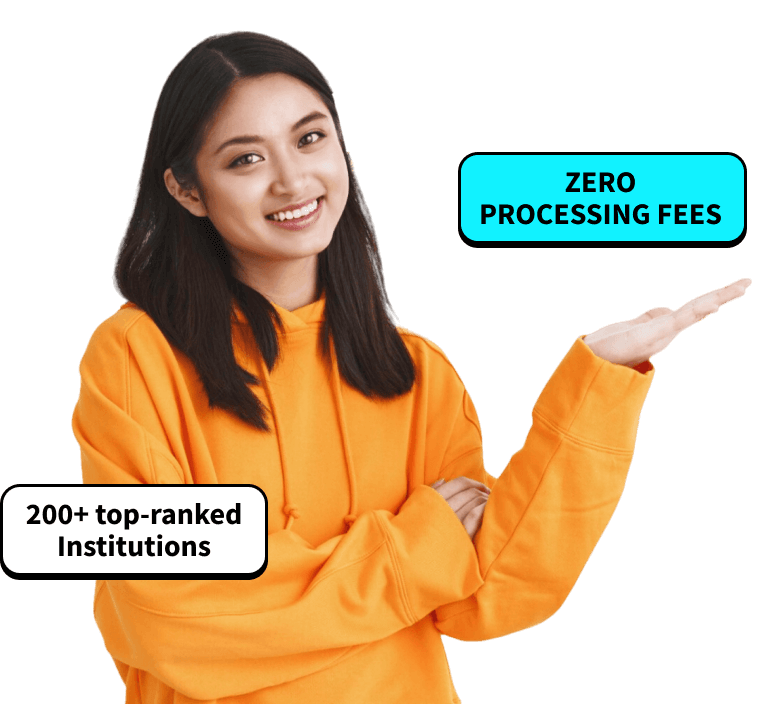STUDY IN DENMARK
Scandinavian Elegance – A Dynamic Journey of Learning in Denmark
Embark on a dynamic learning journey in Denmark, where Scandinavian elegance meets a focus on welfare, equality, and innovation.
FACTS
Learn everything you need to know about studying in Denmark

CAPITAL
Copenhagen

Currency
Danish Krone

Language
Danish

International Students
34,030+

Population
5.92 Million

Universities & Colleges
8+
Universities
Here are some of the best universities in Denmark where academic excellence takes center stage!
- University of Copenhagen
- Technical University of Denmark
- Aarhus University
- University of Southern Denmark
- Aalborg University
- Copenhagen Business School
- Roskilde University
- International Business Academy
- And Many More
Ready to Explore the Options and Move Ahead with your Educational Voyage
Courses
The programs in Danish HEIs that draw most international students aspiring to study in Europe are
Turn your Study Abroad Dream to Degrees abroad in Denmark
Why choose a Danish University to Study Abroad in Europe?
- Five out of eight Danish universities feature in the QS World University rankings consistently, indicating a high standard of academics in the country.
- Highly regarded for innovative research in areas like medicine, biotechnology, environmental sciences and energy, Danish universities have best-in-class research facilities to aid your studies in the country.
- Public policy in Denmark allows EU/EEA students to pursue tuition-free education. If you hold a Danish residence permit or if one of your parents is from a non-EU/EEA country and working in Denmark, then you are also eligible to get tuition-free higher education in the country.
- Denmark excels in the quality of life, has one of the highest GDP per capita in the world despite an employee-friendly work culture, is a country with a low crime rate, among the best air quality and environmental safety, beside being the happiest country in the world.
- As non-EU/EEA students, you can avail of numerous scholarships and grants to lower your cost of attending a Danish university.
- Denmark stands among the toppers globally for its innovative teaching methodologies.
- Pursue English-taught programs and communicate in English in daily life while in Denmark.
Intakes:
Intake: Winter
Session Starts: August / September
Intake: Summer
Session Starts: January / February
The timeline for application deadlines and session commencements varies institution by institution. Seek guidance from recognized Denmark Education Consultants for accurate details on your preferred university’s timeline.
Tuition Fees
Tuition Fees to obtain a Danish qualification will vary from institution to institution, the average undergraduate and postgraduate tuition fee is €10,050 and €12,865, respectively. Consult with UniApplica team today to learn more.
Scholarships in Denmark
Expert Study in Europe Consultants can help you find the appropriate scholarship program that suits your candidature the most.

The Danish government extends funding options every year to universities in recognition of exceptional full-time degree students from non-EU/EEA countries or Switzerland. To apply for this award, you should hold a residence permit in Denmark to pursue an education. The award may cover tuition fees in part or full, and/or living cost grants. or full or partial tuition fee waivers and/or grants towards covering your living costs. The funding is finally administered by the universities and hence the decision of who receives the award depends upon the board.
Erasmus Mundus/Joint Master Degree – Both EU/EEA and non-EU/EAA students, pursuing specific postgraduate degrees can avail of the Erasmus Mundus program. The programs are joint master’s degrees, awarded as a collaborative qualification from Danish and other European institutions. To learn more about the scholarship award and the application process, it is best to speak to proven Europe Education Consultants.
Fulbright Grant – Academic Exchange students in Denmark from the USA, pursuing a master’s or doctoral degree can avail of the Fulbright grant for an academic year of study and/or research.
Cost of Living
On average, you can manage your living costs in Denmark between €800 – €1,200, although how much you spend depends largely on the lifestyle choices you make.
Particulars | Estimated Monthly Expenses (in Euro) | |
Accommodation | Shared Flat: 450 Studio Room: 500 Halls of Residence: 250 – 300 | |
Basic Grocery | 200 – 270 | |
Local Conveyance | 40 – 50 | |
Books and Stationaries | 30 – 65 | |
Social Activities | 120 – 175 | |
Work Opportunities:
Allowance:
- International students holding a residence permit can work up to 20 hours a week while the school is in session from September to May.
- From June to August, you are allowed to take up full-time employment.
Please note that if you clock more hours at work than what your residence permit allows you to, you are liable to receive a warning, a fine, or a revocation of your permit.
Wages:
In Denmark, instead of a law to specify the minimum wage, each sector fixes it through collective bargaining agreements. On average, the hourly wage that you can expect in the country is DKK110.
After completion of your a university degree in Denmark, you can obtain a residence permit for six months to seek employment. Once you land a full-time job opportunity, you should apply for a new residence permit with details of your employment.
You may qualify for a permanent residence permit in Denmark after living in the country for nine continuous years, being employed for at least 3.5 years in the last four years span, and conversant in Danish, besides several other conditions.

Climate / Weather:
Denmark has a temperate maritime climate, featuring cool summers and mild winters. Summer temperature hovers between 15°C to 22°C, while in winter the mercury is limited from -2°C to 4°C. August and February are the warmest and coldest months, respectively.
How To Apply to Danish Universities to pursue your Study in Europe dream?
- Undergraduate degrees – A School Leaving Diploma equivalent to the Danish upper secondary certificate.
- Postgraduate degrees – A graduation degree equivalent to the Danish UG degree.
You can establish equivalence through approved third-party assessment.
Specific requirements like GPA scored, level of subjects passed, or individual subject scores are listed as pre-conditions for admission into different courses. In case there are gaps in the requirements and your scores, you may have to take supplementary courses before you can start your study program.
Depending upon the program you are applying for, you will have to meet the specific language requirements.
- For English-taught programs, showcase a proficiency level of at least level B.
- For Danish-taught programs, you must prove adequate levels of proficiency in the language through either Danish as a Foreign Language test or Danish Test 2 and Danish Test 3.
- A Danish undergraduate application is through the national admissions portal www.optagelse.dk, while a master’s degree application is directly to the institution.
- In case of Undergraduate application, you can apply to up to eight universities, ranked according to your preference, through a single application.
You must upload all eligibility documents and other required certificates along with your application. Please note that your scanned signature is also required for application processing.
You can enlist the help of seasoned Europe Education Consultants to put together all admission documents and complete the application process to Danish Universities.

Danish Study Visa Guidance
Visa Category:
- Students from Iceland, Norway, Sweden or Finland can live, study and work in Denmark without a visa, residence permit or work permit. They should have a valid identification card in person.
- Students from the EU/EEA and Switzerland are allowed to live in Denmark for up to 90 days provided they can show a valid passport on demand. For a longer stay, they need to obtain a Danish registration certificate from the Regional State Administration in the country.
- Non-EU/EEA students need a visa for a short stay (less than 90 days) in Denmark and a residence permit for a longer period of stay.
Visa Application Fees: €195 | Visa Processing Time: 2 months
Danish Residence Permit Application Process
- Submit your application to the Danish Agency for International Recruitment and Integration (SIRI)
- Pay the visa application fee
- Submit required documentation.
- Complete the application form. The application can be both online and offline. Please note that the application form has two parts, of which one is to be filled out by the Danish educational institution where you have enrolled. You need to fill out the other part and submit the visa application.
- Register your biometrics (facial photo and fingerprints) at a Danish diplomatic mission.
- Await your visa decision.
Documentation required for the Danish Residence Permit:
- Application fee payment receipt or bank statement. Payment status from the website is not acceptable.
- Copy of all pages of your valid passport, including the front and back covers, and all empty pages.
- Acceptance letter from the Danish university you have signed up with.
- Proof of language proficiency
- Proof of the availability of adequate funds to support yourself in Denmark (DKK 6,397 a month)
Documentation required for Students below 18 years of age:
- An NOC signed by both parents
- Copy of birth certificate
- Copy of the data page in your parents' passport
- A properly signed and stamped undertaking from the school accepting responsibility of your study and living conditions in the country.


Beyond Borders, Beyond Limits
Elevate Your Education with Global Opportunities! Unite with
Leading Advisors and an Empowered Study Abroad Community.
FAQs
Why Study Abroad With UniApplica?
UniApplica covers the basics every Study needs. For everything, Anything.
No, you do not need to be proficient in Danish if you are pursuing an English-taught program in Denmark. A wide range of programs in the country has English as the medium of instruction. International students can sign up for these programs to study in Europe after sufficiently proving their language proficiency. Further, the Danes are conversant in English as a second language, hence communicating in day-to-day life will also be not a problem. However, to work in the country after graduation, you will have to develop fluency in Danish.
Although the Danish visa requirements do not specify an IELTS score as a pre-condition for approval, most public universities in the country would want non-EU and non-native English speakers to submit proof of language proficiency in the form of IELTS, PTE or TOEFL scores. Secure an IELTS band score of 6 for an undergraduate degree and 7 for a postgraduate degree in Denmark to avoid any hassles.
Danish universities accept an academic break of up to 2 years. However, you should put forth adequate reasoning to explain the gap.
In Denmark, higher education is free for only domestic and EU students. International students, however, have to pay tuition fees for the programs they attend in the country. To reduce the cost of attending a Danish university, you can apply for various scholarships and grants. You can also avail of government assistance for living expenses while attending university.
Upon arrival in Denmark with your residence permit, register your local address with the nearest municipality to receive a Danish personal registration number (CPR).
